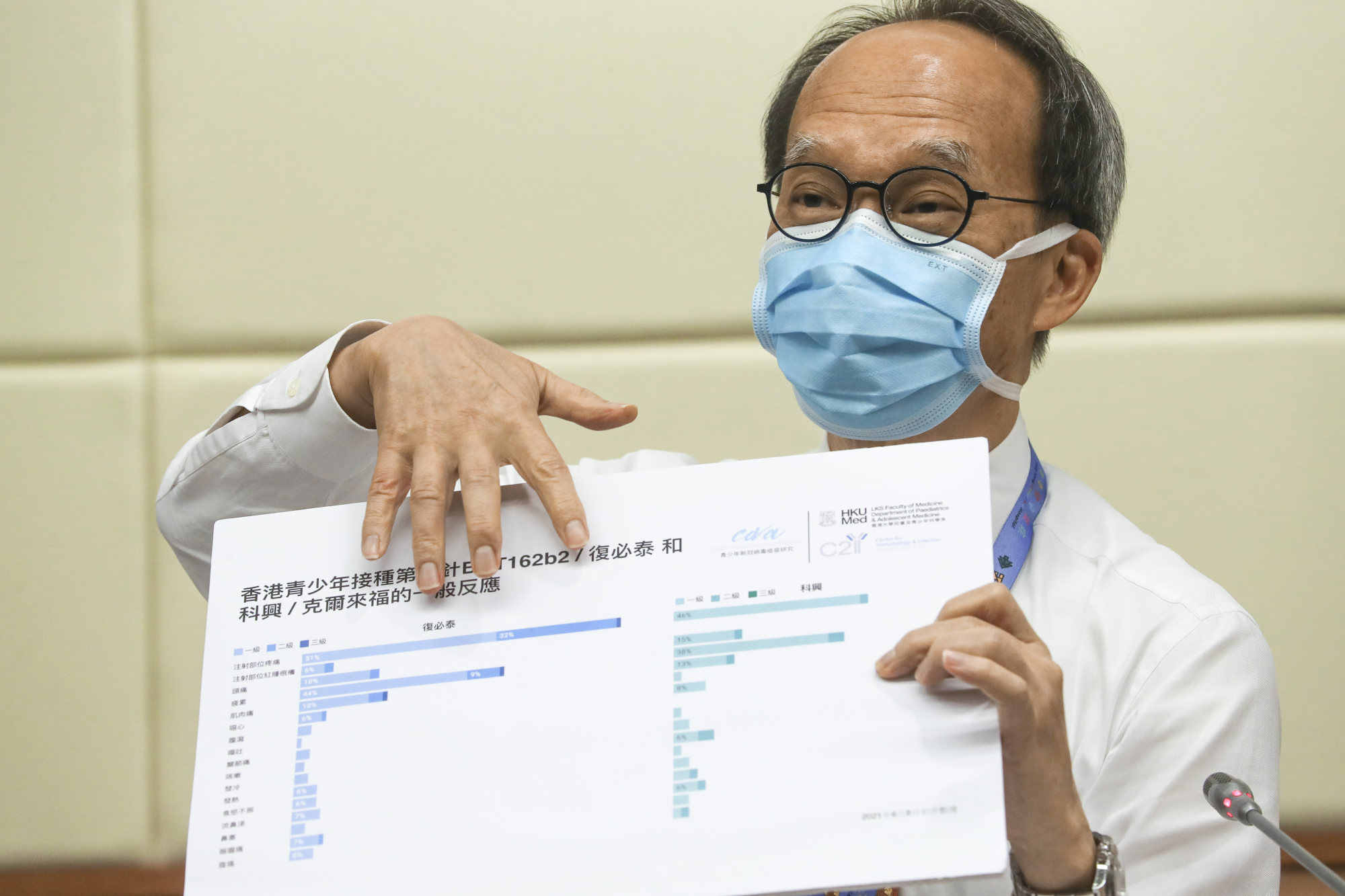
Coronavirus: Hong Kong experts back making BioNTech’s Omicron-specific vaccine alternative to fourth dose
- Data proves efficacy of German-made vaccine against original strain of virus as well as Omicron subvariants BA.4 and BA.5, Professor David Hui says
- Experts also agree to shorten minimum interval period between doses of BioNTech paediatric vaccine for some children aged six months to five years old
Professor David Hui Shu-cheong, a member of the Scientific Committee on Vaccine Preventable Diseases, on Thursday said additional data had proved the efficacy of the German-made vaccine against the original strain of the virus as well as Omicron subvariants BA.4 and BA.5.
“There is more data now showing that the antibodies produced by [the new vaccine] are as good as the antibodies produced by the vaccine based on the original strain of the virus,” he said after attending a joint meeting with the committee on zoonotic diseases.
“It is difficult to predict which subvariants will emerge in the future. It takes time to find that out. Therefore, we suggest that we should widen the [vaccine’s] coverage [of different virus strains].”

BioNTech’s second-generation booster contains a bivalent formulation, meaning it is based on two virus strains – the original Covid-19 type, as well as the BA.4 and BA.5 lines. Hui told the Post the vaccine might arrive in the city as early as January.
But Professor Lau Yu-lung, chairman of the Scientific Committee on Vaccine Preventable Diseases, previously said the procurement of the vaccine would be a waste of resources and untimely, as the currently available inoculations alone could prevent serious symptoms and death. But he said his committee backed the call to make the Omicron-specific vaccine available.
“I’m at peace with the decision as I have expressed my views to the press and everyone in the past few days. Government officials also know about my opinions,” Lau said after Thursday’s meeting.
“I have also promised the controller of the Centre for Health Protection that I will stop commenting on the bivalent vaccine at this stage.”
Currently, children aged between six months to three years old have to wait seven weeks between the first and second doses of the Chinese-made Sinovac doses, and at least three months between the second and third doses.
Children aged five or above can receive the second dose of a BioNTech vaccine at least eight weeks after the first one, while only those who are immunocompromised can receive a third jab.
Hong Kong health experts call for shorter grace period for third Covid jab
The BioNTech vaccine for children aged as young as six months was approved by Hong Kong on Wednesday, but it is currently unavailable in the city. A government spokesman said the same day that authorities were waiting for the manufacturer to provide the schedule and information on its supply.
The experts panels had agreed to shorten the minimum interval period between the first two doses of BioNTech paediatric vaccine from eight to three weeks for children aged six months to five years old with “personal needs”, while the recommended interval period for others remained at eight weeks.
They suggested that if individuals under 18 experienced severe side effects after the first dose, they could switch to the other vaccine for their second and third jab.
The first three doses of Sinovac vaccine were also recommended to be four weeks apart for immunocompromised children as young as six months, while the fourth dose could be given three months later.
The interval period for the first two doses of BioNTech vaccine received by these children could be three weeks, the experts added, with the third one given four weeks later. The fourth shot should be given three months after the third one.
Straight to the point: a look at second-generation Covid jabs for Hong Kong
But Lau urged residents not to wait for new types of shots, urging them to get inoculated with the available jabs.
“Sinovac and BioNTech are both effective in preventing the development of severe cases and death [as shown in] local data on children,” he said. “Two doses of both vaccines can prevent severe cases or deaths by around 90 per cent. There were no hospitalisations among those who had received three shots.”
Speaking on a radio programme, Microbiologist Ho Pak-leung welcomed the mixing of vaccines, saying that the added flexibility would lead to more parents getting their children vaccinated.
Hong Kong health advisers divided over buying BioNTech’s second-generation booster
“If some parents want to get the BioNTech vaccine, they will have to wait [for it to arrive]. Even though the government has been saying the vaccines are equally effective, some parents might disagree,” Ho said.
“Their children might have received three doses of Sinovac and couldn’t switch to BioNTech, or they could have got one dose of Sinovac, only to be told that BioNTech will be available next week. There’s a lot of uncertainty for parents [who prefer BioNTech] right now.”
.


